Q&A: Symantec President On Why He Isn't Worried About McAfee's Spinout From Intel
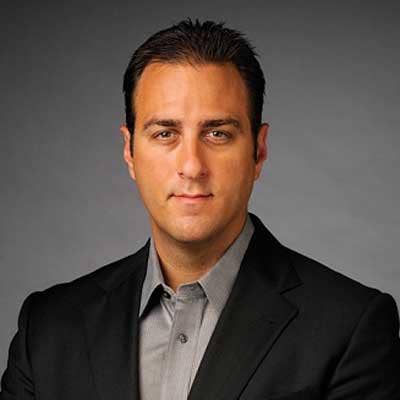
Fey On The Record
McAfee spun out from parent company Intel earlier this year, but Symantec President and COO Michael Fey said he isn't worried about the effect it will have on Symantec's business. Fey said Symantec has a strong set of technologies and a platform security strategy, one he argued McAfee was a step behind on. As part of the June magazine issue, CRN sat down with Fey to talk about the competitive landscape and how Symantec will position itself as legacy rivals re-emerge and it faces continued challenges from startups. Take a look at what Fey had to say about Symantec's strategy, McAfee's position in the market, and what it all means for partners.
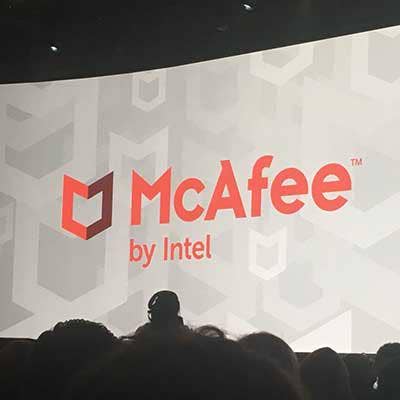
How do you look at where McAfee stands today after the spinout from Intel?
I think they have begun their journey to be an independent company. It's far from done. When you think about where they're at and their own identity and building back that, they certainly have to now go establish who they are and how the market should think of them and which product areas we should expect from them. There's a large amount of technical debt they've got to build back up, and that's going to take some strong investment at a time when historically [private equity] companies try to drive a little bit better margin -- so are they entering a cost-cut phase? Are they going to get further investment beyond just acquisition investment?
I think there's a big series of questions to watch, and they're the only people that know the answers.
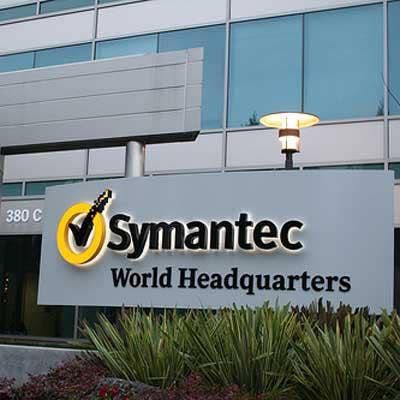
Will the McAfee spinout affect Symantec or how Symantec goes to market?
No, not really. I think we already were entering into the age of the platform wars where customers were moving past the simple startup, the next better widget, the slightly better catch rate and into one of operationalization and integration. How do these things come together? How do they work? I think that's clearly been our mantra. There's a couple other cyber companies that are trying to make that their mantra. That is a conversation that these bigger companies are going to be able to have. You can't be a platform as a single product vendor. You can be a value-added addition to a platform. The market for the smaller end of town, and even from the higher end of town, hasn't been healthy. These companies weren't building sustainable business models and you're seeing the bigger companies now say, 'OK, great. Now that the market realizes that, if there is good tech there and there is a good customer base, maybe we'll consolidate some of these areas.'
True consolidation hasn't started yet. I think there's been some acquisitions, but I look forward to seeing some more consolidation down the road as the need to have sustainable growth and sustainable innovation starts to become a mantra.

How would you define platform security as you see it?
I think when you look at the old way of looking at it, a platform was the best effort to have a single console, a single element, a one-and-done kind of installation thought process. That’s not the way the world appreciates it today. The way the world appreciates it today is, 'I’ll give you a core part of my control fabric that I can run automation and orchestration through. Can I drive new cyber security outcomes from you?' It’s not about the ROI of running it. It’s about, can you do things to protect me that have never been done before? That’s where we’ve been putting our investment. We believe we’ve almost got 40 examples now of new cybersecurity capabilities that come from an integration across a platform, not just managing them, which is the old school, and it’s really why the old-school approach never led to any real dominance in any given area. [There's] real tangible outcomes of a platform and that’s what’s driving our growth right now -- that conversation of new cybersecurity capabilities and innovation from a platform, not just consolidation.

So how is your approach to the platform different from McAfee's if you both, at a high level, are talking about security integrations and automation?
I think the approach is significantly different. I think the reality is they haven’t proceeded to progress in the next generation of cybersecurity so the concept of orchestration is one about partnering more than it is about delivering outcomes. What do I mean by that? We have cloud offerings now from the proxy layer, the web cleansing, email, DLP, MFA, full cloud-enabled platform. That’s a platform you can actually integrate across and drive different functionality from. It’s not just that it’s open and somebody can write to it. That’s the difference.
The other approach is almost one of a point vendor saying, 'My product can be integrated to by other better products.' While we’re open to being integrated to and we encourage our competitors and partners and customers to integrate with us, we also stand alone with the ability to deliver a full cyber posture across our platform. Then over the years we’ve seen McAfee actually get rid of products and step back from the larger community. We stepped forward. We’re in more spaces today than we were a year ago or two years ago. We represent a larger amount of the security footprint on this planet than we did a couple years ago, where they represent a smaller one.

Do you feel more threatened by McAfee as a competitor now that they're spun out from Intel?
To be honest, without Intel’s resources they’re weaker than with Intel’s resources. They now have to stand on their own two feet. They have to compete in a real market P&L and they have to innovate without the promise of a chipset. … With the brain drain that’s occurred over there, they’ve got to now staff back up as well and get real talent in.
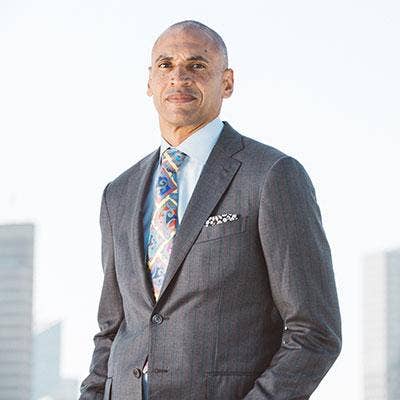
What would you say to McAfee CEO Chris Young (pictured) if you ran into him in a bar?
I like Chris. I think Chris is a good guy, nice guy, smart man. I wish them luck. I congratulate him on the hard work that I’m sure has not been easy to break off. The amount of inward meetings he’s had to do to probably figure out how to break systems apart and all the other difficult things that go on with that should be commended. I wish him well.

How do you see Symantec positioned in the market today versus five years ago?
If we think about now versus, say, five years ago, I think we’re infinitely better prepared to compete. Our endpoint franchise is catching more malware than anybody’s on the planet. It’s installed in more endpoints than anybody’s on the planet. Our DLP franchise is as strong as it’s ever been. It’s No. 1 in market share, it’s No. 1 in every ranking you see. Then you look at the network protection layer, a gateway layer. Blue Coat was a strong No. 1 there and now that’s part of not just the Symantec portfolio, but it’s integrated in. Then you see email. We still have a massive email presence that we’re able to bring this innovation and go disrupt the other vendors out there. … For us, when I think about where Symantec was five years ago versus where we’re at now, I couldn’t think of a bigger differentiation as a cybersecurity company between the two. It’s showing in our numbers, it’s showing in our growth, and it’s showing in our people that we’re getting. We’ve got some of the best talent in the world that not only was already here, but is joining us as well because they see this as this is where we’re going to build the future. We're fired up, as you can tell.

Why are we seeing both Symantec and McAfee look to transform their businesses right now? Why is the timing so aligned?
The market has shifted. In that shift, [customers are] asking for vendors to step up and own availability, to own outcomes, to provide SLAs, to do things that you can only ask of a very mature company. The stake is set well for larger cyber companies and this shift by the investor to say, 'Wait a second. Just growth does not make a good investment. We need to understand what profitability it can yield.' This creates a fair playing field upon which the big vendors like ourselves who have an amazing next-generation platform. … That shift has been powerful.
When you saw a company with one product with a market cap larger than people generating billions of dollars of real cash flow, it was difficult to say it was a good time to be a large cybersecurity company. Now that you’ve seen that start to fall apart and people say, 'Now, wait a second. You've got to be profitable. You have to be able to innovate over time. You have to be able to have one product succeed well as another one peels off. You have to offer multiple products to be a big company in the space.' Those demands favor the guys that can deliver real platforms.

What is the impact of these company transformations on partners?
Given how partner-focused we are, I think it’s good for them. We appreciate the reach they give us, the support they give us. We see them as an extension of our go-to-market so I think it’s very positive for them and additionally, as we mentioned before, it increases profitability. They would rather have their customer engagements go deeper into an account, provide more value to that customer and cross more of the security wallet share than just some isolated products that do.
If you sell one of these smaller companies, great. You made that sale. Now what? Well, now you've got to start over again. When you move a platform, now you’ve brought the customer on a journey that you’re going to see them through for the next couple years and so your relationship gets deeper, your value gets deeper, the monetary gains get deeper. The big strong VARs are excited about the ability to do this because they can compete in a new and aggressive way versus some of the smaller VARs that show up with just price and it’s about who’s the better price rather than adding their own unique value to the equation.

Large security vendors like Symantec have also received a lot of criticism for your size and being slow to innovate. How would you respond to that?
I think that’s the other side of the measure -- we’ve answered the bell on being an innovative platform. … We’ve rolled out six different products since I joined. We rolled out six major revisions of our product lines. We’ve acquired some of the hottest tech on the planet and integrated it in. I think the need to innovate has never been lost on large organizations, but if you look at Symantec and you look at McAfee, they might have lost their way along the way. Symantec getting back fully focused on cybersecurity was step one in doing that. … Now you see very healthy books sitting at Symantec. When a company is healthy, they can afford to invest. If you think about the number of R&D engineers I can put on problem, there’s no small company that can touch that. Not being diversified to the point of confusion allows you to do that very well.

Talk about the startup market – how do you see the balance shifting in the competition with some of these next-generation security startups?
I think a lot of the next-generation players had some interesting ideas that have now been made features of larger product families and, because of the amount of money they took, the goals they had to deliver associated with that money might have missed their window to be something meaningful. When you look at these next-gen players, the reality is very little of the innovation was original or that hard to duplicate.
When you hear people try to pigeonhole Symantec or McAfee as signature-based AV, it hasn’t been that way for years and no self-respecting cyber professional would say that. To come out against that as your big milestone, well that’s eventually going to fail. Then, to not participate in the various testing processes that show how good you are and to think that marketing will give you that -- eventually you have to stand up and actually deliver. It only goes so far to say, 'But I’m different.' Eventually you have to deliver. … It’s one thing in the cyber world to get a pop up to $50 million in revenue. It’s another thing to get to $200 million, $300 million, $1 billion. These are real challenges and you have to have a sustainable platform of innovation, not just one bright idea.

How do you see the venture capital environment changing for these security startups?
There’s a lot of great companies out there. I think some of them are at a place where their investors are going, 'Wait a second. Is there really going to be a return?' The abnormal footprint they had, many of these organizations were trying to roll large sales forces of a company 20 times their size. It used to be that the early stage money would help bring great ideas to life. The early stage money is now about establishing sales force and marketing engines, not making sure that you have a great idea that nobody else could over-deliver you on. … The cyber space is such a lucrative space because it’s the one area of IT that is irrefutably growing and needed. When you’re an investor, you want to have your money working in a space like that. Needless to say, the ability to get capital for cybersecurity startups over the last five years is the easiest market that you could imagine from a startup community perspective. But those belts are tightening.

How will customers change their buying patterns as more platform security companies emerge?
I think what we need to have happen is we stop forcing our customers to spend time and energy duplicating basic processes, deploying agents, deploying network gear, deploying SIEMs, deploying all these things, then ripping one out and deploying a new one. We need to set up a platform where great ideas can show up, be monetized by the startup community and deliver into existing frameworks so the customers can just continually get progressively better and not have to take a step backwards to take a step forward. The more progressive companies are starting to standardize on various platforms, integrate those platforms, and then the investments they look to make have to integrate into that framework they’ve built. I think that’s what we see moving forward, which is one where a lot of co-opetition has to occur. We have to be open with each other… but also deliver that fundamental platform that drives a good portion of the core security and delivers on that … so that cyber teams can take their limited resources and keep progressing forward. … It is a big shift for some customers. I will tell you the more progressive companies have been doing this for the last year or two if not longer.

If integrations are so key, why is the security industry so far behind the curve on this? Especially if other industries in IT are doing it?
I think the evolving threat landscape has challenged the industry for years, and I think the large platform players were delivering that void seven years ago. … It’s almost a cyclical resurgence now where the various little bits of startup innovation have packed the environment such that we need to go to one of optimization to enable. … Unlike the rest of IT where you see companies competing against themselves driven by innovation and ROI, we’re driven by innovation, ROI in the attack landscape. The third measure really creates for an interesting dynamic from time to time. … You mentioned before, 'Do I think about my competitors all the time?' You know, I think about the attackers a whole lot more than I think about my competitors. At the end of the day, if I don’t do a good job beating them, then it doesn’t matter what my competitors do.

What role does the channel play in this evolution of the security market?
Our channel can deliver. The channel prefers larger vendors than smaller because they can invest in [them and] it’s more profitable for them to carry fewer lines so it becomes a snowball rolling downhill after a while of why this starts to occur. That’s what we’ve been feeling.
It’s been wonderful for Blue Coat to have access to the larger Symantec channel. It’s been great for us. ... We get a lot more effort put on our product lines and making sure that people can speak that platform conversation because they don’t want to be left out. The days of the channel partner showing up with 30 different technologies and calling that their stack and trying to convince a customer to let them integrate all that mess on their site has disappeared. Now you’re seeing the better VARs having to show up with the core platform and then strategy around integration of areas that they feel are lacking. That makes for the next-generation VAR.

What benefit does a platform strategy bring to a VAR, as you see it?
I think it drives the profitability strongly. It drives their ability to be experts for their customers and it helps their customers embrace the cloud generation. That’s really what we’re seeing right now. Everybody’s trying to figure out how do I embrace the cloud generation, and that’s a strategic design, not a singular product buy. A VAR has to show up with a design that walks through the whole landscape, and the best guys do this now. There’s some great VARs out there with good designs that are doing this and, as it shifts to the cloud, they’re going to have to re-evaluate. The concept of some whiz-bang little feature being offered that doesn’t integrate into that cloud infrastructure isn’t going to work for their overall design for their customers. I think the platform wars will increase profitability for the channel. I think that the ability to consolidate spending around the platform also consolidates around a VAR. Those that are deep with their customers, adding a lot of value, are going to get paid better for the value they offer. … I think we’re transforming just as the platform wars are beginning. I don’t think anybody’s late to the party. I think we’re talking about the next five years or more of the cyber industry.
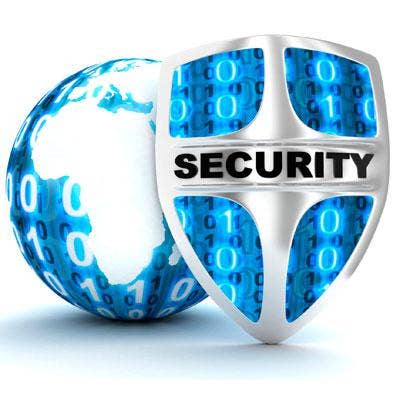
Is it different for a company like Symantec to compete as a platform security company versus a single vendor solution?
I think the reality is your platform better be extensible so that it adds value at the individual product level, then it adds value at the true platform level because if it requires the customer to go holistically in as a starting point, you will fail. For us, we like to think of it [as] our platform can arise in any of the major areas whether it’s email, data, endpoint and network. That gets the core framework upon which we use to integrate everything else together already there. One single purchase starts to bring the platform forward, and then it’s up to us to show value to the customer as their products come up for re-compete, to use our install portion of our platform as a competitive advantage and as a value-add to the customer in their own environment.
Any big plan for a holistic kind of swap-out like an SAP, Oracle bake-off kind of approach, I’d say security is not ready for that. They don’t think that way, they don’t buy that way, and they can’t afford the risk that comes from large swap-outs. It has to be something that evolves over time. It has to be an evolution to the platform, not a revolution to one.

What's the next step for Symantec?
What’s really going to turbocharge all this for us is we took all those properties and we fully cloud-enabled them so we can ride the future of cybersecurity. That’s what gives me confidence. Every competitor out there is going to want to try to pigeonhole us into some legacy conversation that they will not be able to deny we’re the only ones fully cloud deployed. We’re the only ones that can offer this stuff in that next-generation environment that everyone is going to end up in. Even when you go to the so-called next-generation endpoint companies, they don’t run on the next-generation endpoints. … Now is the time is to transition to the next architecture and that’s one that lives on-prem and off-prem that delivers on the cloud and in the private cloud. That’s where these platforms are not only going to do well, but they’re required.